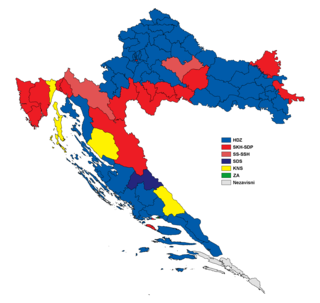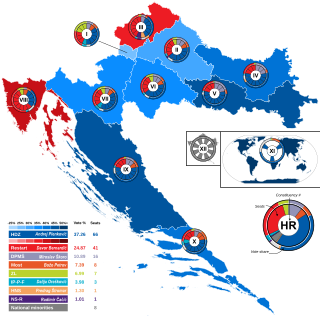The politics of Croatia are defined by a parliamentary, representative democratic republic framework, where the Prime Minister of Croatia is the head of government in a multi-party system. Executive power is exercised by the Government and the President of Croatia. Legislative power is vested in the Croatian Parliament. The Judiciary is independent of the executive and the legislature. The parliament adopted the current Constitution of Croatia on 22 December 1990 and decided to declare independence from Yugoslavia on 25 May 1991. The Constitutional Decision on the Sovereignty and Independence of the Republic of Croatia came into effect on 8 October 1991. The constitution has since been amended several times. The first modern parties in the country developed in the middle of the 19th century, and their agenda and appeal changed, reflecting major social changes, such as the breakup of Austria-Hungary, the Kingdom of Serbs, Croats and Slovenes, dictatorship and social upheavals in the kingdom, World War II, the establishment of Communist rule and the breakup of the SFR Yugoslavia.
Presidential elections were held in Croatia on 15 June 1997. They were the second presidential elections held since independence in 1991. The result was a victory for incumbent president Franjo Tuđman, the leader of the Croatian Democratic Union party (HDZ), who received 61.40% of the vote and was re-elected to a second five-year term. As Tuđman received a majority of the valid votes cast on election day there was no need for a run-off. President Tuđman received a plurality of the votes in 20 of Croatia's 21 counties, while Vlado Gotovac did so in Istria County.

Parliamentary elections were held in Croatia on 23 November 2003 to elect all 151 members of parliament. They were the fifth parliamentary elections to take place since the first multi-party elections in 1990. Voter turnout was 61.7%. The result was a victory for the opposition Croatian Democratic Union (HDZ) which won a plurality of 66 seats, but fell short of the 76 needed to form a government. HDZ chairman Ivo Sanader was named the eighth Prime Minister of Croatia on 23 December 2003, after parliament passed a confidence motion in his government cabinet, with 88 MPs voting in favor, 29 against and 14 abstaining. The ruling coalition going into the elections, consisting of the Social Democratic Party (SDP), Croatian People's Party (HNS), Croatian Peasant Party (HSS), Party of Liberal Democrats (Libra) and the Liberal Party (LS), did not contest the elections as a single bloc; the SDP ran with the Istrian Democratic Assembly (IDS), the Party of Liberal Democrats (Libra) and the Liberal Party, HNS ran with the Alliance of Primorje-Gorski Kotar (PGS) and the Slavonia-Baranja Croatian Party (SBHS), while HSS ran on its own.

The Croatian Parliament or the Sabor is the unicameral legislature of Croatia. Under the terms of the Croatian Constitution, the Sabor represents the people and is vested with legislative power. The Sabor is composed of 151 members elected to a four-year term on the basis of direct, universal and equal suffrage by secret ballot. Seats are allocated according to the Croatian Parliament electoral districts: 140 members of the parliament are elected in multi-seat constituencies. An additional three seats are reserved for the diaspora and Croats in Bosnia and Herzegovina, while national minorities have eight places reserved in parliament. The Sabor is presided over by a Speaker, who is assisted by at least one deputy speaker.

The Croatian Democratic Union is a major conservative, centre-right political party in Croatia. Since 2016, it has been the ruling political party in Croatia under the incumbent Prime Minister Andrej Plenković. It is one of the two major contemporary political parties in Croatia, along with the centre-left Social Democratic Party (SDP). It is currently the largest party in the Sabor with 55 seats. The HDZ governed Croatia from 1990 before the country gained independence from Yugoslavia until 2000 and, in coalition with junior partners, from 2003 to 2011, and since 2016. HDZ is a member of the Centrist Democrat International, International Democracy Union, and the European People's Party, and sits in the European People's Party Group in the European Parliament. HDZ is the first political party in Croatia to be convicted of corruption.

The Social Democratic Party of Croatia is a social democratic political party in Croatia. The SDP is anti-fascist, progressive, and strongly pro-European. The SDP was formed in 1990 as the successor of the League of Communists of Croatia, the Croatian branch of the League of Communists of Yugoslavia, which had governed Croatia within the Socialist Federal Republic of Yugoslavia since World War II.
The Istrian Democratic Assembly is a centre to centre-left, regionalist, liberal political party in Croatia primarily operating in Istria County.

The Croatian Social Liberal Party is a conservative-liberal political party in Croatia.

The Croatian People's Party – Liberal Democrats is a social-liberal political party in Croatia.
Regular elections in Croatia are mandated by the Constitution and legislation enacted by Parliament. The presidency, Parliament, county prefects and assemblies, city and town mayors, and city and municipal councils are all elective offices. Since 1990, seven presidential elections have been held. During the same period, ten parliamentary elections were also held. In addition, there were nine nationwide local elections. Croatia has also held three elections to elect members of the European Parliament following its accession to the EU on 1 July 2013.

Parliamentary elections were held in the Socialist Republic of Croatia between 22 and 23 April 1990; the second round of voting occurred on 6–7 May. These were the first free, multi-party elections held in Croatia since 1938, and the first such elections for the Croatian Parliament since 1913. Voters elected candidates for 356 seats in the tri-cameral parliament; the turnout in the first round ranged between 76.56% and 84.54% for various parliamentary chambers. In the second round, the turnout was 74.82%. The Croatian Democratic Union (HDZ) won 205 seats, ousted the League of Communists of Croatia – Party of Democratic Reform (SKH-SDP) from power and ended 45 years of communist rule in Croatia. The new parliament convened for the first time on 30 May, elected Franjo Tuđman as President of the Croatian Presidency and soon after renamed the office to President of Croatia.

Parliamentary elections were held in Croatia on 29 October 1995 to elect the 127 members of the Chamber of Representatives. The election was held in conjunction with special elections for Zagreb City Assembly, which resulted in the Zagreb Crisis.

Parliamentary elections were held in Croatia on 3 January 2000 to elect members of the Chamber of Representatives.

Parliamentary elections were held in Croatia on 25 November 2007 and for overseas voters on 24 and 25 November. The campaign officially started on 3 November. The President of Croatia announced elections on 17 October and 14 days were allowed for candidate lists to be submitted.
The Left of Croatia was a marginal leftist Croatian political party with no parliamentary representation.

In Croatia, the Opposition comprises all political parties represented in the Croatian Parliament that are not part of the Government which is supported by the parliamentary majority.

Parliamentary elections were held in Croatia on 8 November 2015. All 151 seats in the Parliament were up for election. This parliamentary election was the 8th since the first multi-party election in 1990 and the first since Croatia joined the European Union in 2013. The ruling center-left Croatia is Growing coalition, led by Prime Minister Zoran Milanović, was challenged by the center-right Patriotic Coalition led by the HDZ and headed by its party chairman Tomislav Karamarko, and also faced several new political coalitions.

Parliamentary elections were held in Croatia on 5 July 2020. They were the tenth parliamentary elections since the first multi-party elections in 1990 and elected the 151 members of the Croatian Parliament. 140 Members of Parliament were elected from geographical electoral districts in Croatia, three MPs were chosen by the Croatian diaspora and eight MPs came from the ranks of citizens registered as belonging to any of the 22 constitutionally recognized national minorities.

European Parliament elections were held in Croatia on 26 May 2019, electing members of the national Croatia constituency to the European Parliament. These were the third such elections in the country since its accession to the European Union in 2013.














